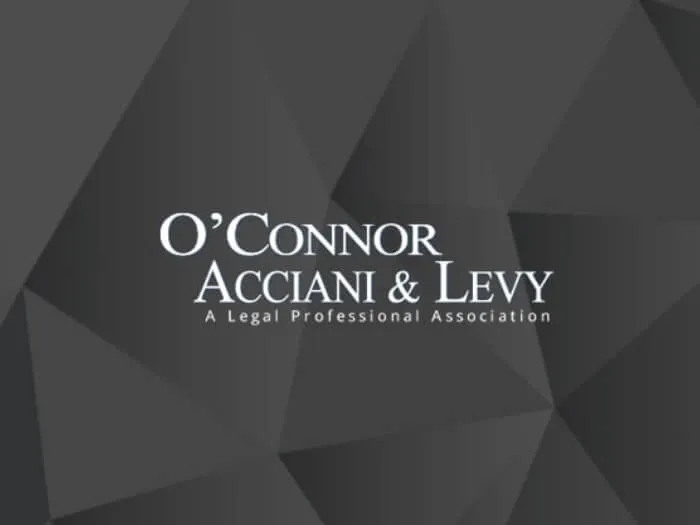Experienced Personal Injury Attorneys in Dayton

A serious injury can drastically alter your life. You may face a challenging physical recovery involving countless painful procedures, hospital stays, operations, and physical therapy.
You may also find yourself struggling with uncertainty, inadequacy, anger, depression, and anxiety. On top of that, an injury can cause financial difficulties as you try to pay for the treatments you need, especially if you are left unable to work while recovering.
If you suspect that somebody else is responsible for your injury, speak with a knowledgeable Dayton personal injury lawyer at O’Connor, Acciani & Levy about your legal options. They can help you recover your financial losses in a civil suit against the at-fault person or company.
Why Choose Our Dayton Personal Injury Lawyers?
The personal injury attorneys in our Dayton office have helped file personal injury claims for many types of accidents. Some of the most common incidents include:
- Motor vehicle crashes
- Medical mistakes
- Slip and falls and other premises liability accidents
- Animal bites
- Sporting accidents
- Defective or damaged products
- Dangerous drugs
- Construction accidents
- Workplace accidents
- Intentional violence, including gunshots and stabbing wounds
Our skilled legal team knows how to investigate accidents and apply local laws when pursuing personal injury claims.
Steps in Bringing a Dayton Personal Injury Claim
Anytime a person's negligent, intentional, or reckless misconduct seriously harms another person, the injured victim could pursue a civil suit against the at-fault party. To prevail, the plaintiff would need to show that the at-fault party's wrongful actions more likely than not caused the injury.
At O’Connor, Acciani & Levy, our skilled personal injury lawyers have experience helping injured claimants receive the compensation they deserve by taking the following steps:
- Determine the cause of the injury: a lawyer would comb through the relevant evidence and speak with all available witnesses to determine what caused the accident that led to the injury.
- Identify who is liable: an attorney would analyze whether the evidence indicates that anyone else bears legal responsibility for the accident.
- Evaluate the severity of the injury: our team would meet with a claimant's doctors to review the severity of the injury in order to determine the impact on the claimant’s life.
- Determine the value of a claimant's case: after evaluating the severity of the injury, our attorneys would examine other losses from the accident. This could include lost income or medical bills, as well as other intangible losses such as pain and suffering.
- Negotiate: if appropriate, our attorneys could skillfully and aggressively negotiate with the other side to reach a fair settlement agreement.
- Try the case: if the defendant or their insurance company is unwilling to offer a fair settlement, our attorneys would be ready to take the case to trial.
Common Mistakes to Avoid After an Injury in Dayton
If you've been injured due to someone else’s negligence, the steps you take after the incident can have an impact on your personal injury claim. Avoid these common mistakes.
1. Delaying Medical Treatment

Even if you think your injuries are minor, it’s important to see a doctor as soon as possible. Many injuries, such as whiplash or internal bleeding, may not show symptoms immediately but can worsen over time.
Additionally, failing to get medical attention can make it difficult to prove that your injuries were caused by the accident, weakening your claim for compensation.
2. Not Documenting the Scene or Evidence
Accidents happen quickly, and it’s easy to overlook the importance of gathering
evidence. However, failing to document the scene can make it harder to prove fault later. Take photographs of the accident site, your injuries, damage to vehicles or property, and anything else relevant to the incident.
Collect witness contact information, if possible, as their statements can strengthen your case.
3. Speaking to Insurance Companies Without Legal Help
Insurance adjusters may seem helpful, but their primary goal is to minimize payouts. If you speak to them without consulting a personal injury attorney, you might unintentionally say something that could harm your claim.
Avoid giving recorded statements or signing any documents from an insurance company until you've talked to a skilled Dayton personal injury lawyer at our law firm.
4. Failing to Report the Accident
Whether it’s a car crash, slip and fall, or workplace injury, you must report the incident to the appropriate authorities or management.
For example, car accidents should be reported to the police, and workplace injuries must be documented with your employer. Filing a report creates an official record of the event, which is essential for building a legal claim.
5. Posting on Social Media About the Incident
While it may be tempting to share updates about your situation on social media, doing so can backfire. Insurance companies and opposing legal teams often scrutinize social media posts to find anything they can use against you. Even innocent photos or statements about feeling “okay” could be misinterpreted and used to argue that your injuries are not as severe as claimed.
6. Not Following Your Doctor’s Orders
Your recovery process is important not only for your health but also for your legal case. Ignoring medical advice, skipping follow-up appointments, or stopping treatment prematurely can give the impression that your injuries are not serious.
Follow your treatment plan to ensure the best possible outcome for both your health and your claim.
7. Waiting Too Long to Speak with an Attorney
Ohio law sets strict deadlines for filing personal injury claims, known as the statute of limitations. Waiting too long to talk to an experienced personal injury lawyer in Dayton could cause you to miss this deadline. Speaking with an attorney early ensures your case is filed on time and allows them to gather evidence while it’s still fresh.
We’re Here to Guide You Through the Legal Process

Recovering from an injury is stressful, but you don’t have to go through it alone. Avoiding these common mistakes will protect your health and strengthen your chances of receiving fair compensation.
At O’Connor, Acciani & Levy, our Dayton personal injury attorneys are here to handle the legal process. Contact us today for a free consultation and to learn more about how we can help you.
Car Accident Frequently Asked Questions (FAQs)
1. How long do I have to file a personal injury claim in Ohio?
Ohio law sets a strict deadline (Ohio Rev. Code § 2305.10) for filing a personal injury claim. Generally, you have two years from the date of your injury to initiate legal action.
This applies to most types of personal injury cases, such as car accidents, slip and fall incidents, and medical malpractice claims. Failing to file within this timeframe may mean you lose the right to seek compensation for your damages.
However, some exceptions may modify this deadline. For instance:
- Injuries involving minors may allow an extension until the child turns 18, plus two additional years.
- Where the injury wasn’t immediately discovered (for example, in medical malpractice situations) the law might allow more time. This is known as the “discovery rule.”
To protect your rights and ensure your case is filed on time, you should speak with a skilled Dayton personal injury lawyer at our law firm as soon as possible after your incident.
2. What compensation can I recover in a personal injury case?
If you’ve suffered harm due to someone else’s negligence, you may be entitled to recover different types of compensation, also known as damages. These are typically divided into two categories:
- Economic Damages: These compensate for measurable financial losses, such as:
- Medical expenses: Covers current and future treatment, surgeries, therapy, and medication.
- Lost wages: Reimburses income lost while you recover, including future earning potential if you’re unable to return to your job.
- Property damage: Repairs or replaces personal property damaged in the incident, such as your vehicle in a car crash.
- Non-Economic Damages: These are for intangible losses related to your physical and emotional suffering, including:
- Pain and suffering
- Loss of enjoyment of life
- Mental anguish or emotional distress
- Loss of companionship (in cases where a loved one’s accident impacts your relationship with them)
Your personal injury attorney will carefully evaluate your case, reviewing all evidence and consulting experts if needed, to determine fair compensation for your unique situation.
3. Do I need to pay upfront for legal representation?
No, the Dayton personal injury lawyers at O’Connor, Acciani & Levy work on a contingency fee basis. This means there are no upfront costs for our legal services—you won’t pay a penny unless we successfully recover compensation for you.
Here’s how it works:
- Our team handles legal fees during your case, such as court filing costs, expert consultations, and investigations.
- Once you receive a settlement or court award, our fee will be a percentage of the compensation recovered. This ensures we only succeed if you succeed.
If you’re worried about the financial burden of hiring an attorney, rest assured that pursuing justice and fair compensation won’t cost you anything unless we win your case.
Making Legal Terms Simple: Your Personal Injury Glossary
Understanding complicated legal terms can be overwhelming, especially when you're dealing with the stress of an injury. That’s why we’ve created this helpful legal glossary. Here, you’ll find clear and straightforward definitions of common terms you might encounter during your personal injury case.
Negligence
The failure to act with the level of care that someone of ordinary prudence would have exercised under the same circumstances. For example, a driver who runs a red light and causes an accident may be deemed negligent.
Liability
Legal responsibility for one's actions or inactions. If someone is found liable for your injury, they are obligated to compensate you for the resulting damages.
Damages
The financial compensation awarded to an injured person in a personal injury case. Damages are categorized as economic (medical bills, lost wages) and non-economic (pain and suffering).
Statute of Limitations
The deadline for filing a personal injury lawsuit. In Ohio, the statute of limitations for most personal injury cases is two years from the date of the injury.
Plaintiff
The person who files a lawsuit seeking compensation for harm or injury caused by another party's wrongful actions.
Defendant
The individual, company, or entity being sued in a personal injury case. The defendant is alleged to have caused harm to the plaintiff.
Settlement
An agreement reached between the plaintiff and the defendant (or their insurance company) to resolve a case without going to trial. Settlements often involve a payment to the plaintiff.
Compensation
The money awarded to a plaintiff in a personal injury case to cover losses such as medical expenses, lost income, and emotional hardship.
Civil Suit
A legal case brought by one party against another in a non-criminal matter, such as a personal injury lawsuit.
Contingency Fee
A payment arrangement where an attorney only gets paid if they win or settle the case. The lawyer usually receives a percentage of the compensation awarded.
If you have further questions, feel free to reach out to our knowledgeable legal team at O’Connor, Acciani & Levy.
Let Our Dayton Personal Injury Attorneys Assist You
The role of a Dayton personal injury lawyer is to fight for the compensation that an injured claimant deserves and needs. If you suffered serious harm because of another person’s negligence, you need to reach out to a legal team you can trust.
The lawyers at O’Connor, Acciani & Levy are prepared to advocate on your behalf and protect your rights. Call us today to review the details of your case and see if you have a viable claim for damages.